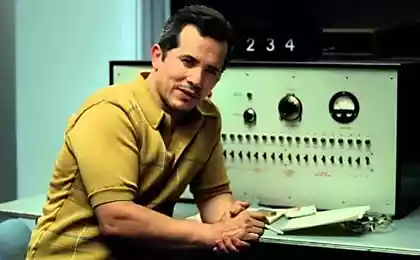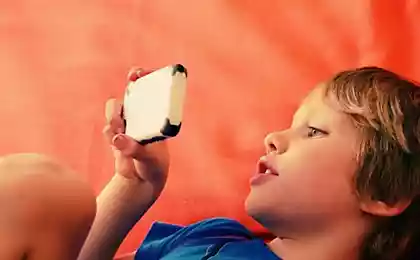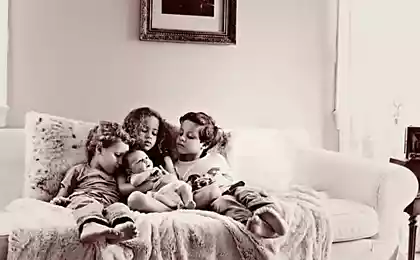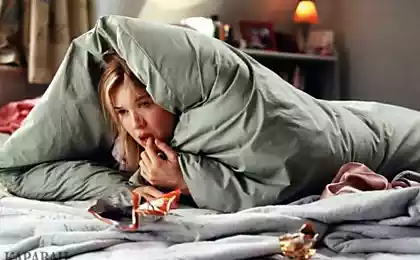426
Children's dependency on gadgets-the shocking results of the experiment
The essence of the experiment:
Children 12 to 18 years offered voluntarily spend eight hours alone, excluding the possibility to use the means of communication (mobile phones, Internet). At the same time they were forbidden to turn on the computer, any gadgets, radio and TV. But were allowed a number of classic sessions with myself: writing, reading, playing musical instruments, painting, needlework, singing, walking, etc.
The author of the experiment (family psychologist) wanted to prove his working hypothesis that modern kids too much fun, not able to do and quite familiar with your inner world. According to the rules of the experiment, the children had to come strictly the next day and tell how tested alone. They were allowed to describe their condition during the experiment, record actions and thoughts. In the case of excessive anxiety, discomfort or stress psychologist recommended to immediately stop the experiment, record the time and cause of his termination.
At first glance, the idea of the experiment seems quite harmless.
Here and psychologist mistakenly believed that it would be perfectly safe. So shocking results of the experiment were not expecting anyone. Of the 68 participants until the end of the experiment brought only THREE of them — one girl and two boys. The three had any suicidal thoughts. Five sharp has experienced "panic attacks". 27 observed direct autonomic symptoms — nausea, sweating, dizziness, flushes, pain in the abdomen, feeling of "perturbations" of hair on the head, etc. Almost everyone has experienced the feeling of fear and anxiety.
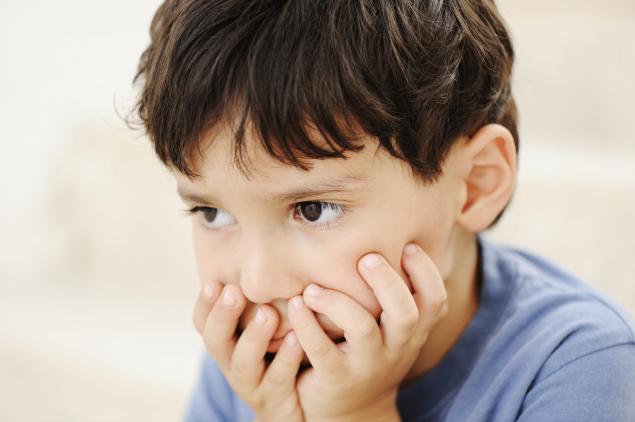
The novelty of the situation, the interest and the joy of meeting with him disappeared almost all the second or third hour. Only ten people from the interrupted experiment felt anxiety in three (or more) hours of loneliness.
Heroic girl who brought the experiment to the end, brought me a diary in which she for eight hours described in detail his condition. Here is the hair stirred on the head by a psychologist. From ethical considerations, she did not publish these records.
What did the Teens during the experiment?
— cooked, and ate;
— read or tried to read
— did some school assignments (it was the holidays, but out of desperation, many grabbed textbooks);
— staring out the window or staggering around the apartment;
— went outside and went to the store or cafe (chat was forbidden by the conditions of the experiment, but they decided that the sellers or the cashier doesn't count);
— folded puzzle or the designer "LEGO";
— drew or tried to draw;
— washed;
— he was cleaning the room or apartment;
— played with the dog or cat;
— worked at the gym or doing gymnastics;
— write down their feelings or thoughts, wrote a letter on paper;
— played guitar, piano (one on flute);
three wrote poetry or prose;
— one boy almost five hours went around the city on buses and trolleybuses;
— one girl embroidered on canvas;
— a boy went to the amusement Park and for three hours we dokatalsya to the point that it began to vomit;
— one young man went to Saint Petersburg from end to end, about 25 km;
— one girl went to the Museum of political history and another boy to the zoo;
one girl prayed.
Almost all at some point tried to fall asleep, but no one came, in the mind of the obsessive spinning "stupid" thoughts.
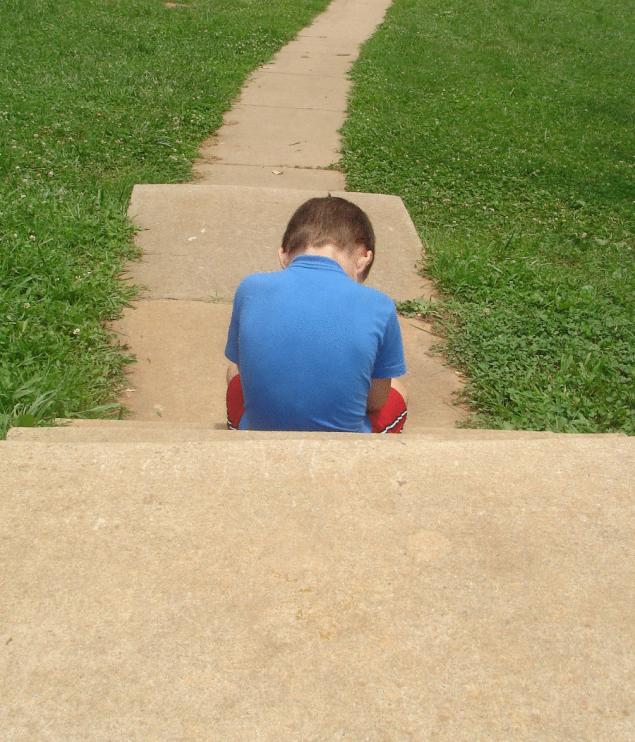
Stopping the experiment, 14 teenagers got into social networks, 20 called friends on a cell phone, call three parents, five went to a friend's house or in the yard. The others turned on the television or immersed in computer games. In addition, almost all and almost immediately turned on the music or stuck in-ear headset.
All the fears and symptoms disappeared immediately after the termination of the experiment.
63 teen retroactively recognized experiment useful and interesting for self-knowledge. Six repeated it yourself and claim that the second (third, fifth) times they did.
When analyzing happened to them during the experiment, 51 people used the phrase "dependence", "it turns out I can't live without...", "dose", "breaking", "syndrome", "I need...", "getting off the needle", etc., without exception, said that was terribly surprised by the thoughts that had occurred to them during the experiment, but failed them carefully "consider" because of the deteriorating General condition.
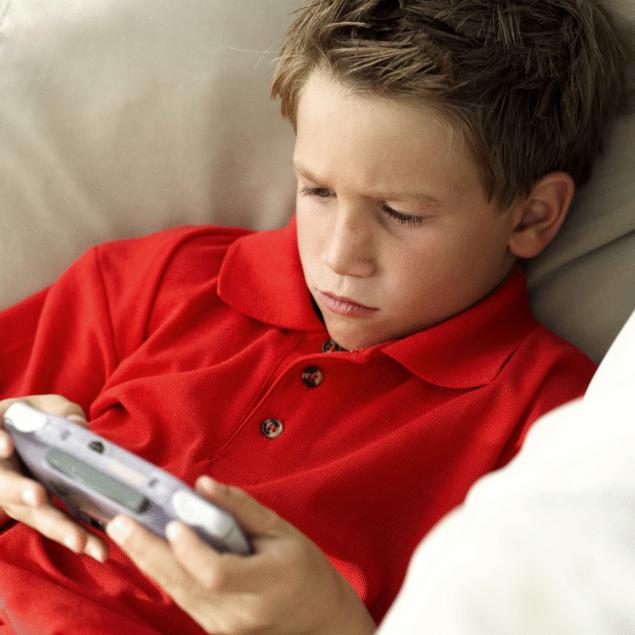
One of the two boys who have successfully completed the experiment, all eight hours had pasted a model of a sailing ship, with a break for food and a walk with the dog. Another first to understand and organize their collections, and then transplanted flowers. Neither one nor the other has not experienced during the experiment in any negative emotions and not noted the occurrence of "strange" thoughts.
Should think about it...
The book of Catherine Murashova "to love or to educate".
And your children will be able to spend at least one day without electronic devices?
We're accustom themselves to dependence from their children...
Source: /users/87
Children 12 to 18 years offered voluntarily spend eight hours alone, excluding the possibility to use the means of communication (mobile phones, Internet). At the same time they were forbidden to turn on the computer, any gadgets, radio and TV. But were allowed a number of classic sessions with myself: writing, reading, playing musical instruments, painting, needlework, singing, walking, etc.
The author of the experiment (family psychologist) wanted to prove his working hypothesis that modern kids too much fun, not able to do and quite familiar with your inner world. According to the rules of the experiment, the children had to come strictly the next day and tell how tested alone. They were allowed to describe their condition during the experiment, record actions and thoughts. In the case of excessive anxiety, discomfort or stress psychologist recommended to immediately stop the experiment, record the time and cause of his termination.
At first glance, the idea of the experiment seems quite harmless.
Here and psychologist mistakenly believed that it would be perfectly safe. So shocking results of the experiment were not expecting anyone. Of the 68 participants until the end of the experiment brought only THREE of them — one girl and two boys. The three had any suicidal thoughts. Five sharp has experienced "panic attacks". 27 observed direct autonomic symptoms — nausea, sweating, dizziness, flushes, pain in the abdomen, feeling of "perturbations" of hair on the head, etc. Almost everyone has experienced the feeling of fear and anxiety.

The novelty of the situation, the interest and the joy of meeting with him disappeared almost all the second or third hour. Only ten people from the interrupted experiment felt anxiety in three (or more) hours of loneliness.
Heroic girl who brought the experiment to the end, brought me a diary in which she for eight hours described in detail his condition. Here is the hair stirred on the head by a psychologist. From ethical considerations, she did not publish these records.
What did the Teens during the experiment?
— cooked, and ate;
— read or tried to read
— did some school assignments (it was the holidays, but out of desperation, many grabbed textbooks);
— staring out the window or staggering around the apartment;
— went outside and went to the store or cafe (chat was forbidden by the conditions of the experiment, but they decided that the sellers or the cashier doesn't count);
— folded puzzle or the designer "LEGO";
— drew or tried to draw;
— washed;
— he was cleaning the room or apartment;
— played with the dog or cat;
— worked at the gym or doing gymnastics;
— write down their feelings or thoughts, wrote a letter on paper;
— played guitar, piano (one on flute);
three wrote poetry or prose;
— one boy almost five hours went around the city on buses and trolleybuses;
— one girl embroidered on canvas;
— a boy went to the amusement Park and for three hours we dokatalsya to the point that it began to vomit;
— one young man went to Saint Petersburg from end to end, about 25 km;
— one girl went to the Museum of political history and another boy to the zoo;
one girl prayed.
Almost all at some point tried to fall asleep, but no one came, in the mind of the obsessive spinning "stupid" thoughts.

Stopping the experiment, 14 teenagers got into social networks, 20 called friends on a cell phone, call three parents, five went to a friend's house or in the yard. The others turned on the television or immersed in computer games. In addition, almost all and almost immediately turned on the music or stuck in-ear headset.
All the fears and symptoms disappeared immediately after the termination of the experiment.
63 teen retroactively recognized experiment useful and interesting for self-knowledge. Six repeated it yourself and claim that the second (third, fifth) times they did.
When analyzing happened to them during the experiment, 51 people used the phrase "dependence", "it turns out I can't live without...", "dose", "breaking", "syndrome", "I need...", "getting off the needle", etc., without exception, said that was terribly surprised by the thoughts that had occurred to them during the experiment, but failed them carefully "consider" because of the deteriorating General condition.

One of the two boys who have successfully completed the experiment, all eight hours had pasted a model of a sailing ship, with a break for food and a walk with the dog. Another first to understand and organize their collections, and then transplanted flowers. Neither one nor the other has not experienced during the experiment in any negative emotions and not noted the occurrence of "strange" thoughts.
Should think about it...
The book of Catherine Murashova "to love or to educate".
And your children will be able to spend at least one day without electronic devices?
We're accustom themselves to dependence from their children...
Source: /users/87



